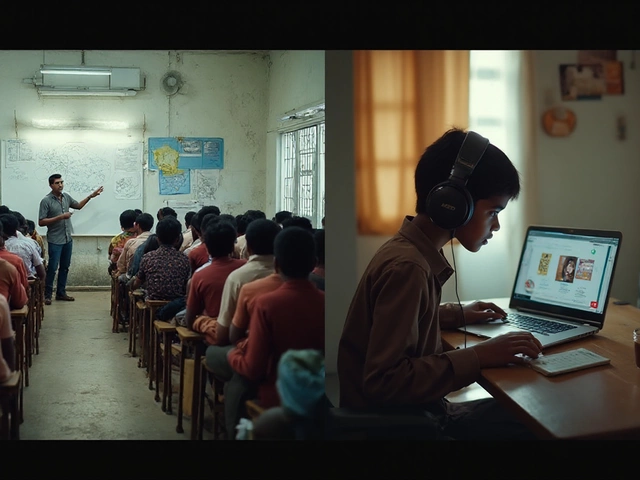
If you ask around, plenty will quickly say that beating the infamous JEE Advanced exam without coaching is nearly impossible these days. The anxiety is real—India’s “biggest exam” feels designed to filter out all but the most persistent. Yet, every few years, stories pop up about someone who pulled it off solo, no classes, no slick online courses, just grit and smart planning. That contradiction is wild, right? The truth: yes, it’s been done, and not by the children of geniuses or people who “just happened” to be prodigies. Real, ordinary students have done it with self study, and their stories are actually more common than you might think.
Who’s Actually Done It? Real Stories of JEE Advanced Self Study Toppers
Easily, two or three headlines pop up every year where toppers credit self study for their JEE Advanced ranks. Take Kanishka Mittal—AIR 17 in 2021—she prepped in a small city without joining any coaching institute, banking on textbooks and a strict routine. There’s also Satvik Garg (AIR 71, 2018), who went solo, explaining in interviews how he stuck to NCERTs, solved heaps of previous year questions, and kept screen time low. These aren’t isolated cases. A study by IIT-Delhi in 2023 found that about 18% of JEE Advanced rankers reported self study as their main prep strategy. That’s about 3,500 students per year clearing one of India’s toughest entrance exams leaning only on personal discipline, textbooks, and maybe some online resources.
Here’s the kicker: not everyone who “self studies” does it exactly the same way. For some, it means creating their timetable, picking what to study when, and using standard books. Others might dip into a few YouTube lectures or borrow notes from friends then do the rest themselves. But the core idea is the same—they aren't spoon-fed. One Reddit thread in 2024 had dozens of ex-IITians chiming in with anecdotes about friends who cracked JEE Advanced from remote villages with unstable internet and, in some cases, power outages during study sessions. The stories feel almost cinematic—except, these are real kids fighting distractions and gaps, showing almost anyone can replicate the approach with the right tweaks.
Of course, self study isn’t a magic bullet. These success stories all share a few core habits: consistency, smart resource selection, and, above all, relentless self-analysis. Miss a goal and they figure out exactly where they slipped. Get stuck on a chapter? They don’t hesitate to look for help, but they never let it derail their schedule. You don’t see them mindlessly binging tutorials or collecting every book under the sun—they stay agile, focusing only on what serves their final aim.
Why People Choose Self Study over Coaching—and the Perks No One Talks About
So why risk it? Isn’t coaching the safer bet? The answer is pretty layered. For some, cost is a deal-breaker. Coaching institutes charge over Rs 1.5 lakh per year in bigger cities (sometimes more)—add living expenses, and it quickly balloons. For students in semi-urban towns, this isn’t even an option. Others just hate the grind of coaching—long hours, fixed routines, zero control over what or how they learn. A 2022 survey by Careers360 actually found that 42% of JEE aspirants who skipped coaching did it to avoid burnout and “groupthink.”
The freedom of self study is underrated. When you control your timetable, you play to your own strengths. Some people are night owls; others can focus only for two hours at a stretch. Self study allows quick pivots—if you’re acing Physics but lagging in Organic Chemistry, you can reallocate time in real time. This customization is almost impossible in a batch-based approach where everything moves at a set pace.
There’s another, sneaky perk to self study—it forces you to become super honest about your achievements and weaknesses. There's no teacher pacing the room to spoon-feed a formula or check why you bombed a practice test. You learn to confront your own gaps and push yourself harder. This habit is gold at IIT and beyond—companies and grad schools consistently love self-starters who need minimal hand-holding.
That’s not to say there aren’t drawbacks. Isolation can make motivation nosedive. Distractions multiply, especially with social media a tap away. Without a structured peer group, you risk not knowing where you stand against the competition. Yet, smart self-studiers actively counter this by joining online forums, taking part in competitions, and scheduling regular mock tests to benchmark their progress. By adding just a few community elements, they get the best of both worlds: freedom and some healthy pressure.

The Blueprint: How Toppers Structure Self Study for JEE Advanced
What separates a strategic self-studier from a casual one? The answer’s in how they plan, revise, and measure progress. All high performers set a rigid but realistic timetable. Think six to eight hours a day—split into targeted slots for Physics, Chemistry, and Maths. Mornings go to toughest subjects when the mind is fresh; evenings are set aside for revision or problem-solving marathons. The famous Pomodoro method—25-minute study bursts with 5-minute breaks—pops up in almost every toppers’ story.
Book selection is laser-focused. NCERTs form the absolute base; for deeper concepts, names like HC Verma (Physics), OP Tandon (Chemistry), and TMH or Cengage (Maths) keep repeating. But these aren’t just stacked on the shelf—they’re annotated, dog-eared, filled with personal mnemonics and quick revisit flags. A former AIR 121 mentioned he treated every exercise like a “mini-test”—never moving forward until confident about each type of problem.
Previous years’ papers are a goldmine. Every single topper who went the self study route points to solving at least ten years’ JEE Advanced papers as a non-negotiable. They analyze types of questions that repeat, shifting difficulty over years, and where they trip up. Mock tests from trusted online sources like FIITJEE and Resonance test series fill in the simulation gap—they treat these as the real exam, down to the last-minute timing and process.
This structure sounds rigid, but adaptability rules. Toppers swear by bi-weekly or monthly reviews—measuring what’s stuck and what’s not, tweaking schedules, cutting out inefficient strategies, and occasionally, rewarding themselves with a break. The big insight: self study isn’t chaotic or random. It’s a living process, evolving as their strengths and weaknesses shift through the prep year.
Tools and Resources: Digital, Analog, and Everything in Between
It’s 2025—younger aspirants are digital natives. But instead of tech overwhelming the self-study process, toppers use it as a precise tool. Apps like Anki and Notion help with spaced repetition, organizing notes, and making quick flashcards. YouTube’s full of concept explainers; channels like Physics Galaxy, Organic Chemistry videos by Nucleophile, and ‘Maths All Day’ get regular shout-outs in interviews. Open forums like Quora, Reddit’s r/JEENEETards, and the CollegeDekho Discord server offer community help for tricky problems, motivation, and revision hacks.
But too much digital can backfire. Most self-studying toppers keep online time strictly for doubt clearance and quick information. For the heavy lifting—practice and revision—they stay old school. Handwritten notes matter, and the physical ritual of solving problems on paper helps the best learn from mistakes. Just jotting down formulas by hand or making charts to visualize organic mechanisms cements them better than scrolling endlessly.
Offline resources never go out of fashion. Self study veterans keep print-outs of previous years’ questions handy, use cheap whiteboards for scribbling, and stick Post-it notes of “troublesome concepts” on their study tables. The smartest form small “buddy circles”—2-3 friends with the same goal—where they discuss doubts, quiz each other, but never slip into endless group chatting. Deadlines are shared, and healthy competitiveness keeps everyone sharp without the fatigue of a huge coaching crowd.
So the blend is digital for information, analog for action, and small communities for honest benchmarking. This three-pronged toolkit covers everything coaching would, minus the commute and sticker shock.

Tough Moments: How Self Studying JEE Aspirants Stay Consistent and Motivated
Nobody cruising solo to JEE Advanced glory pretends it’s easy. Burnouts, motivation crashes, and those gnawing existential worries pop up for everyone—whether they're going to Kota’s most expensive coaching or studying in their bedroom. What marks the successful self-studiers is not the absence of low days, but how they bounce back.
The first tool: breaking big goals into little wins. Instead of aiming for “AIR under 500,” they set milestones: “Finish Electrostatics by Sunday,” or “Solve 100 P&C problems this week.” Seeing small wins every day snowballs into big confidence by exam season. Many keep a ‘progress tracker’—notebooks or Excel sheets crossing off chapters and mapping test scores. When motivation dips, a glance at how far they’ve come can turn anxiety into pride.
Next: a ritual to reset on hard days. Successful candidates take short walks, listen to music, or hit the basketball court for a breather. A 2023 report by Allen Career Institute found that JEE toppers—self-study and coaching both—were more likely to “stop, unplug, and restart” than to slog through endless frustration. Calling up a close friend just to vent or review some silly memes helps reset their headspace, too.
But the core message: self study doesn’t mean “go it utterly alone.” Every self-studying topper sought help when stuck—from a mentor, an older sibling, or a trusted teacher. Knowing when to reach out is just as important as toughing it out. They’re also strict about screen discipline. Distractions are everywhere—so a consistent schedule with phone-free slabs, blocking Instagram/TikTok during study hours, and clear “off time” keeps the mind fresh.
There’s no one-size-fits-all magic, but every successful self studier echoes the same advice: respect your limits, track progress religiously, reward yourself after tough chapters, and never be afraid to seek help early. The myth that only coaching robots can ace JEE Advanced is quietly being dismantled each year, one self-guided radical at a time.





